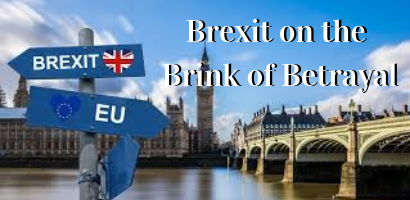As the official deadline for Britain to leave the European Union has come and gone without a hint of Brexit taking place, Parliament seems determined to override the will of the people and sound the death knell of freedom. Each week, Liberty Nation shines a light on the dark rumblings in the British Isles that portend the betrayal of Brexit.
The results are in for the European Union parliamentary elections, and it doesn’t look good for the long-term prospects of the political trading bloc. In countries throughout the continent, anti-E.U. parties made huge gains that will undoubtedly upset the cozy applecart, yet the real danger comes not from those who seek to leave the E.U. but rather those who intend to reform it.
Major Results at a Glance

Nigel Farage (center) and party
Britain: As expected, Nigel Farage’s recently formed Brexit Party took the lead spot in the belabored United Kingdom, winning 29 seats in the European Parliament, way ahead of the second-place Liberal Democrats, who back a second referendum. Prime Minister Theresa May’s (for now) Conservative Party had its worst result in more than 150 years, finishing fifth.
France: Marine Le Pen’s anti-E.U. nationalist, anti-mass immigration National Rally won 5.3 million votes compared to President Macron’s 5.1 million. At present that gives them 23 seats each, but when Britain finally leaves the union, Le Pen will gain one more seat, making her the leader of the largest party.
Italy: Deputy Prime Minister Matteo Salvini is celebrating with 34.4% of the votes, making his League Party the largest by a clear 12%.
The Grand Coalition
 In the European Parliament, power is gained and exercised through “time on the floor.” Being able to make speeches and present arguments is the cornerstone of persuasion and the only path to applying influence in a parliament that does not allow its members to propose laws (this is the sole purview of the European Commission).
In the European Parliament, power is gained and exercised through “time on the floor.” Being able to make speeches and present arguments is the cornerstone of persuasion and the only path to applying influence in a parliament that does not allow its members to propose laws (this is the sole purview of the European Commission).
Time to speak is awarded based on the size of the group a party or parliamentarian is connected with: the larger the group, the more talking time. This means all those who won a seat in the May 23-26 election will seek to form coalitions with like-minded colleagues across the 28 (soon to be 27)-nation bloc.
Yet these new groups appear not to be coalescing around being an effective work outfit but to seize the reins of power and recast the entire project in their nationalist image.
An Unbeatable Foe?
The European Union sees itself as a nation. It has a flag, an anthem, laws, a Parliament, an army, a navy, a police force, and courts. It relegates real countries to little more than provinces within the larger state, with scant regard for history, tradition, or culture.
And the leaders of the E.U. see those who would either destroy or take power away from the core commission as traitorous and treasonous souls.
As the author Taylor Caldwell wrote in A Pillar of Iron:
“A nation can survive its fools, and even the ambitious. But it cannot survive treason from within. An enemy at the gates is less formidable, for he is known and carries his banner openly. But the traitor moves amongst those within the gate freely, his sly whispers rustling through all the alleys, heard in the very halls of government itself. For the traitor appears not a traitor; he speaks in accents familiar to his victims, and he wears their face and their arguments, he appeals to the baseness that lies deep in the hearts of all men. He rots the soul of a nation, he works secretly and unknown in the night to undermine the pillars of the city, he infects the body politic so that it can no longer resist. A murderer is less to fear.”
Yet these supposed “traitors” have been elected by the people of Europe to do just what the E.U. accuses them of plotting. These are traitors welcomed by the electorate who willingly hold open the gates for those who wear the badge of E.U. treason proudly.
~
At Liberty Nation, we love to hear from our readers. Comment and join the conversation!



